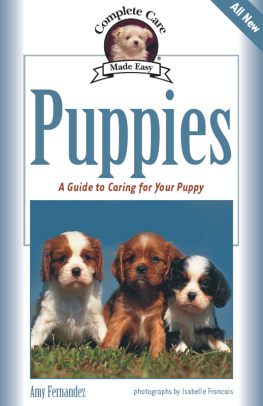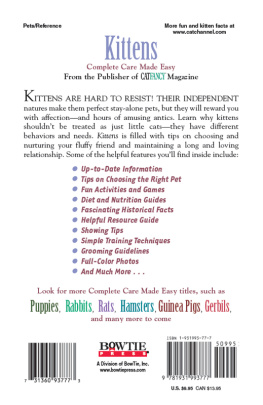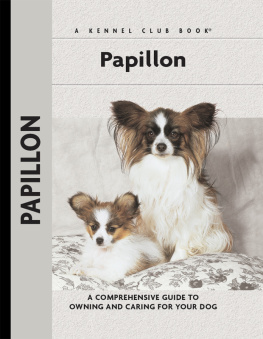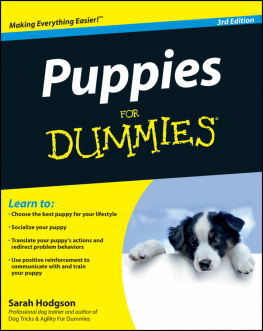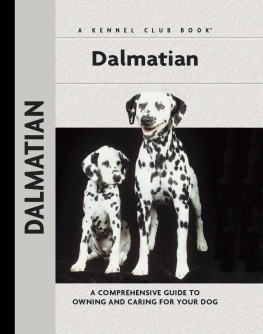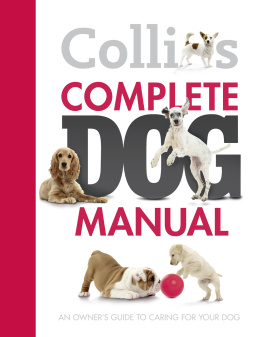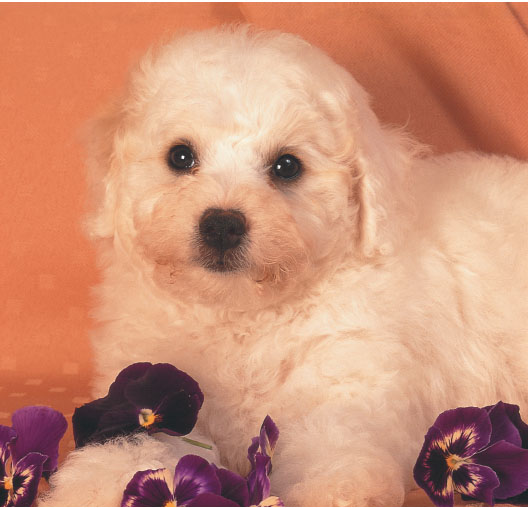
Karla Austin, Business Operations Manager
Nick Clemente, Special Consultant
Barbara Kimmel, Managing Editor
Jarelle Stein, Editor
Jackie Franza, Consulting Editor
Honey Winters, Design
Indexed by Melody Englund
The puppies in this book are referred to as he and she in alternating chapters unless their gender is apparent from the activity discussed.
Photographs Copyright 2006 by Isabelle Francais. Photographs on pages 16, 18, 82, 144, 146, and 160 Copyright 2006 by Maureen Blaney Flietner.
Text Copyright 2006 by I-5 Press
All rights reserved. No part of this book may be reproduced, stored in a retrieval system, or transmitted in any form or by any means, electronic, mechanical, photocopying, recording, or otherwise, without the prior written permission of I-5 Press, except for the inclusion of brief quotations in an acknowledged review.
Library of Congress Cataloging-in-Publication Data
Fernandez, Amy.
Puppies : a guide to caring for your puppy / Amy Fernandez ; photographs by Isabelle Francais.
p. cm. (Complete care made easy)
Includes index.
ISBN 1-931993-76-9
eISBN 9781937049317
1.Puppies. I. Title. II. Series.
SF427.F462 2006
636.7'07dc22
2006002178
I-5 Press
A Division of I-5 Publishing, LLC
3 Burroughs
Irvine, California 92618
Printed and bound in Singapore
10 9 8 7 6 5 4 3 2 1
Acknowledgments
D EDICATED TO MY FRIEND B RENDA M ACON, THE BEST owner any puppy could hope for. My thanks to Barbara Kimmel, who helped to shape this book.
Amy Fernandez

Contents
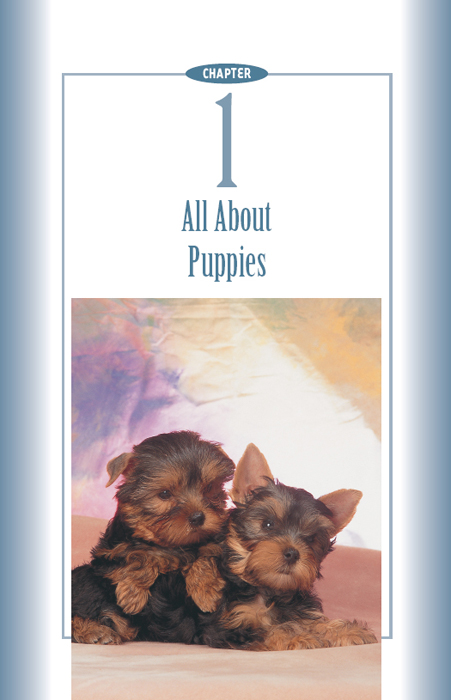
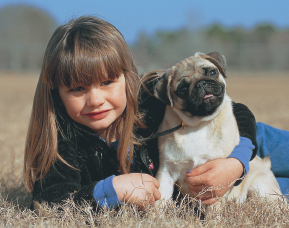
A new owner cuddles her pug puppy.
A CCORDING TO THE 2005/2006 A MERICAN P ET Products Manufacturers Associations National Pet Ownership Survey, Americans own more than seventy-three million dogs. There are many reasons for owning a dog, among them are the sheer fun and unconditional love a dog offers. For many people, no aspect of dog ownership is more rewarding than the bonding, nurturing, and trust that come from raising a puppy. It is a remarkable experience on many levels. Regardless of how hectic or demanding your life is, the day-to-day responsibilities of caring for a puppy keep you grounded and remind you to appreciate what is really important in lifeyour relationships with the people and animals around you. In addition, modern science has proven that daily interaction with a dog is just plain good for you! Studies have shown that owning a dog lowers stress, encourages regular daily exercise, and often speeds recovery times after major surgery.
Puppies Through the Ages
People have recognized and enjoyed the benefits of canine companionship for thousands of years. Many historians believe this enduring bond began when ancient humans adopted and raised orphaned wolf puppies. Archaeological excavations have discovered wolf and human remains at the same sites dating back four hundred thousand years. The wolf was the first species to be successfully domesticated.
DNA evidence and physical variations between ancient wolf and modern-day dog skeletons show that the dog was a genetically separate species from the wolf at least forty thousand years ago and was definitely domesticated by fifteen thousand years ago. By the beginning of the Stone Age (circa 7000 BC), the dog had become a common feature of human settlements, whereas evidence of domesticated livestock did not begin to appear at human habitation sites until one thousand years later.
Researchers believe that the domestic dog first evolved in eastern Asia. The parent animals were descendants of a smaller wolf species, the Indian wolf. From eastern Asia, early dogs migrated with humans to populate the Middle East, Africa, and Europe and eventually across the Siberian land bridge to North and South America.
Scientists comparing ancient wolf skulls with todays dog skulls have found the latter to be smaller and more rounded, with narrower jaws, shorter muzzles, and smaller teeth. These physical changes of domestication were accompanied by equally dramatic behavioral changes. The domestication process altered the wolfs natural wariness, making the dog more trusting, curious, and tolerant of unfamiliar experiences. The ability to accept variations in diet and living conditions allowed the dog to benefit from the emerging ecological niche created by human evolution.
Domestication actually enhanced the wolfs reproductive capability. A primary feature of domestication is the ability to breed in captivity. At least eight thousand years ago, humans began deciding which animals would be bred. Canine traits originally developed in response to natural selection were suppressed or enhanced through artificial selection. So began the evolution of specialized dog breeds.
Hunting dogs were selectively bred to be larger, smaller, faster, or stronger to better pursue different types of game. As humans became increasingly dependent on livestock and farming, dogs were adapted to new roles, including herding and guarding valuable livestock, defending a homestead in an owners absence, and eradicating mice and rats.
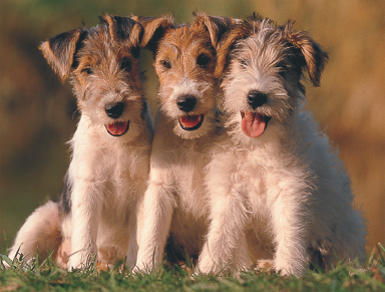
The ancestors of this trio of wire fox terriers were bred by English hunters to root foxes out of their lairs and to kill vermin.
Ancient civilizations, such as those of the Greeks, Romans, Persians, and Celts, contributed to the creation of specialized dog breeds. The forerunners of most of our modern purebreds (mastiffs, greyhounds, spaniels, and terriers) existed in some form by the Middle Ages. Hunting dogs, sheepdogs, and terriers remained vital to the survival of most of the population. Certain breedsfor instance, refined sporting dogs such as the Scottish deerhound and exotic companion breeds such as the Maltesewere primarily associated with the aristocracy.
Modern purebreds trace their roots to the formation of the first dog shows and kennel clubs in the mid-nineteenth century, when breeds were defined and categorized according to ancestry and purpose. New breeds, such as the fox terrier and the Brussels griffon, were developed; exotic foreign breeds, such as the Pekingese, were brought to public attention; and many popular breeds, such as the Irish setter, transitioned from the realm of the working dog to that of the companion dog. More than four hundred recognized dog breeds exist today.
Puppies Today
Most dogs no longer fulfill their original functions, but this has not diminished their appeal. Humans still choose to share their lives with dogs of every shape and size. Their varied talents are suited to every interest and lifestyle. There are, for example, sporting breeds that make good matches for active dog owners and companion breeds better suited for a quiet life at home. Some breeds remain highly popular despite the fact that their traditional working roles have become obsolete. Conformation shows and Earthdog, field, and herding trials ensure that unique canine traits are not lost. A working trial can provide an outlet for your dogs natural instincts and give you an opportunity to appreciate her traditional heritage.

